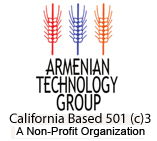Gevorg Gabrielyan -- ATG Foundation Director Has Successful First Year
December 7, 2003
For additional photos related to this article, visit the ATG Photo Gallery.
Yerevan, Armenia — Gevorg Gabrielyan is a farmer at heart. “I like to work with soil,” he says. “It helps me reëvaluate events, values, and people. And working with soil helps to bring up your children properly. When we are in our family orchard, our whole family works and, I think, all of them are happy. Is there anything more satisfying than seeing the results of your work?”
When the Armenian Technology Group (ATG) appointed Gabrielyan to head its operations in Armenia in February 2003, the country’s vineyards and orchards were dormant and its mountain fields were covered with snow. At the ATG Foundation office in Yerevan, plans were being made for the year’s upcoming activities, which included the continuation of long-term projects and the development of new programs. Gabrielyan, who holds a doctorate and is from the Yegheknadzor region of southern Armenia, was ready for the challenge.
ATG has been one of the leading non-governmental organizations in Armenia in the field of implementing agricultural projects. Its accomplishments in the introduction, testing, and multiplication of American wheat, barley, and alfalfa varieties are incontestable. “ATG has a history of good relations with farmers and agricultural officials in Armenia,” Gabrielyan says. “An example of this is the well they drilled last year in Maisian. The project was spearheaded by ATG, then brought into reality by ATG’s collaboration with the U.S. Department of Agriculture and the Foreign Agricultural Relations Agency.”
When Gabrielyan became director, the new farming season was beginning with problems and difficulties. “I was forced to take responsibility immediately and solve arising problems – especially those in irrigation from May through August. As a result of our efforts, ATG was successfully able to grow, harvest, store, and sell seed for the coming season. And, this was brought about by all ATG employees.”
Long-term efforts bear fruit
ATG’s seed multiplication program is a very important project for Armenia. “No up-to-date agriculture can exist without high-quality seed production,” Gabrielyan emphasizes. “The seed-producing infrastructure that existed in the Soviet period has collapsed. Two state seed-producing organizations have survived, but their capacity meets less than ten percent of market demand. Financially they are in a very vulnerable position. And none of them imports or reproduces Western varieties.”
ATG has assumed responsibility for organizing the production of ‘elite’ American seed in Armenia. If ATG can produce 300 tons of this high-quality seed per year, than local farmers using them can produce approximately 4,000 to 5,000 tons of first-generation seed per year. “This is enough to plant 25,000 to 30,000 hectares, or about 25 percent of all fields in Armenia,” Gabrielyan says.
At present, Armenian farmers have neither another source for new American varieties, or ways to generate high-quality seed for the varieties they already have. “The only source is ATG and its activities,” Gabrielyan says. “This year, ATG began a three-year-cycle seed-breeding process. As a result, we will have our own stable ‘super elite’ seed production. This will enable us to maintain the breeder seed, from which ‘super elite’ [seed] is harvested.”
To ensure a stable base for production of this high-quality seed, ATG determined it needed 150-200 hectares of its own land to organize seed production, house machinery, and build warehouses for seed processing and storage. “55 hectares of land have been purchased, and part has been planted for this season’s seed production.”
Another project ATG has undertaken is the land reclamation program is Sis village, not far from Yerevan. Originally from Azerbaijan, most of the population fled to escape the Azeri pogroms of Sumgait and Baku in 1989. “This project is not a commercial one, but is nevertheless very important,” Gabrielyan says.
This projects has two goals: first, to help a refugee village reclaim and cultivate about 25 hectares of saline land and use the profit from this activity to solve social problems in the village; second, to set up a good plot for testing the reclamation of saline land and leaching technique. “This is important when we take into account the fact that there are more than 10,000 hectares of saline land in Armenia that currently cannot be used for agricultural purposes,” Gabrielyan points out.
“Projects like this aren’t charity,” Gabrielyan adds. “ They create a base that helps Armenian farmers make their land profitable so they can support their families through their labor, with dignity and respect.”
Ancestral ties
The Sis project has special importance for Gabrielyan. “My own ancestors were from the Syunik and Nakhichevan regions of southern Armenia, and were forced to Iran by Shah Abbas in the 16th-century,” he explains. “They were finally able to return to their homeland after the Russo-Iranian War of 1830.”
After their return to Armenia, Gabrielyan’s ancestors settled in a high mountain village. They planted wheat the first year. “But they were unable to harvest the wheat. The crop remained under the snow. That same winter, they founded a new village on the site of a twelfth-century one with an old, collapsed church.”
Like his grandparents, who suffered during both the Tsarist and Soviet periods, Gabrielyan understands the value of bread. “They battled for every piece of bread,” he says. “In the end, having wheat stored for the winter, having bread, is everything.”
The words of the great Armenian poet Hovhannes Toumanyan describe well the devotion Gevorg Gabrielyan has for the land and the people of Armenia:
Understand this well:
Work is immortal;
He who is remembered for his work
Is blessed, and will live forever.
For more information about how you can help Armenia’s farmers, contact the ATG office at (559) 224-1000 or by e-mail (info@atgusa.org). Tax-deductible donations can be sent to ATG; 1300 E. Shaw, Suite 149; P.O.Box 5969; Fresno, CA 93755-5969.
You may also donate to ATG online.

Follow Us